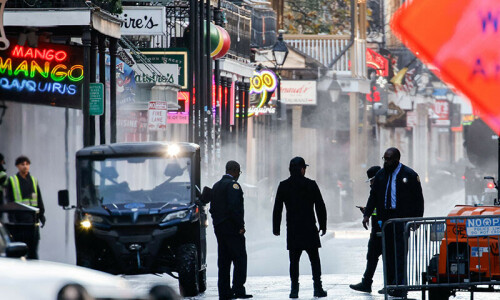Three Palestinians were killed and dozens wounded Friday in clashes between protesters and Israeli forces over new security measures at an ultra-sensitive Jerusalem holy site where police restricted access for Muslim prayers.
The unrest came after Israeli ministers decided not to order the removal of metal detectors erected at entrances to the Haram al-Sharif compound, known to Jews as the Temple Mount.
One Palestinian was shot dead by Israeli gunfire in the A-Tur neighbourhood of east Jerusalem, according to the Palestinian health ministry.
A second Palestinian was killed by gunfire in east Jerusalem's Ras al-Amud district, while a third was shot dead in Abu Dis in the occupied West Bank, the ministry said.
Israel's army confirmed it was involved in clashes in Abu Dis. The Palestinian Red Crescent reported that 391 people were wounded in Jerusalem and the West Bank.
Thirty-eight of those injured in Jerusalem were taken to hospitals. In the West Bank, 98 injuries were caused by live or rubber bullets fired by Israeli forces, it said.
Israeli police reported 29 arrests in Jerusalem and the West Bank, adding that five officers were lightly injured, coming under attack with stones and fireworks.
On Friday, Israeli police barred men under 50 from entering the Old City in annexed east Jerusalem for prayers, while all women were allowed in.
Police said later in the day that discretion could be applied in the use of the metal detectors instead of forcing everyone to go through them. But Palestinian and religious leaders were still calling on worshippers not to enter until they were removed.
Hundreds held midday prayers in the streets near the gates of the Old City in protest. According to police, dozens of people entered the compound.
“They turned back everyone who came here to pray but then I told them I was going to the doctor, but they did not let me in,” said Ulfat Hamad, 42, who was visiting from the United States. “I am going to pray here with the others,” he said outside the walls.
Crowds gathered outside Jerusalem's Old City found shops closed and streets around Damascus Gate — the entrance most heavily used by Palestinians — blocked.
A group of several hundred people, including Muslim leaders, marched towards the Lions Gate entrance to the mosque compound, but police informed them that only men aged 50 or over would be allowed in. Police later fired stun grenades and tear gas towards protesters outside the Old City, while Palestinians threw stones and other objects at security forces in some areas.
'Extremely dangerous'
Tensions have risen since police installed the metal detectors in a move Palestinians and other Muslims perceive as a means for Israel to boost its control over the compound containing the revered Al-Aqsa mosque and Dome of the Rock.
The controversy has resonated beyond Israel and the Palestinian territories, with the United States and the UN Middle East envoy expressing concern. Palestinian president Mahmud Abbas spoke with US counterpart Donald Trump's senior adviser and son-in-law Jared Kushner, urging the White House to intervene, the Palestinians' official Wafa news agency reported.
Turkish President Recep Tayyip Erdogan has called on Israel to remove the detectors. He spoke by telephone with both Abbas and Israeli President Reuven Rivlin on Thursday.
Israeli Prime Minister Benjamin Netanyahu stressed the metal detectors were intended to ensure the safety of worshippers and visitors and not an attempt to disturb the fragile status quo under which Jordan is the custodian of the site and Jewish prayer is forbidden.
Palestinians have been refusing to enter the compound all week in protest against the metal detectors. The main weekly prayers on Fridays draw the largest number of worshippers — typically thousands — and speculation had been mounting that Netanyahu might order the metal detectors removed. But after consultations with security chiefs and members of his security cabinet, Netanyahu decided not to do so.














































